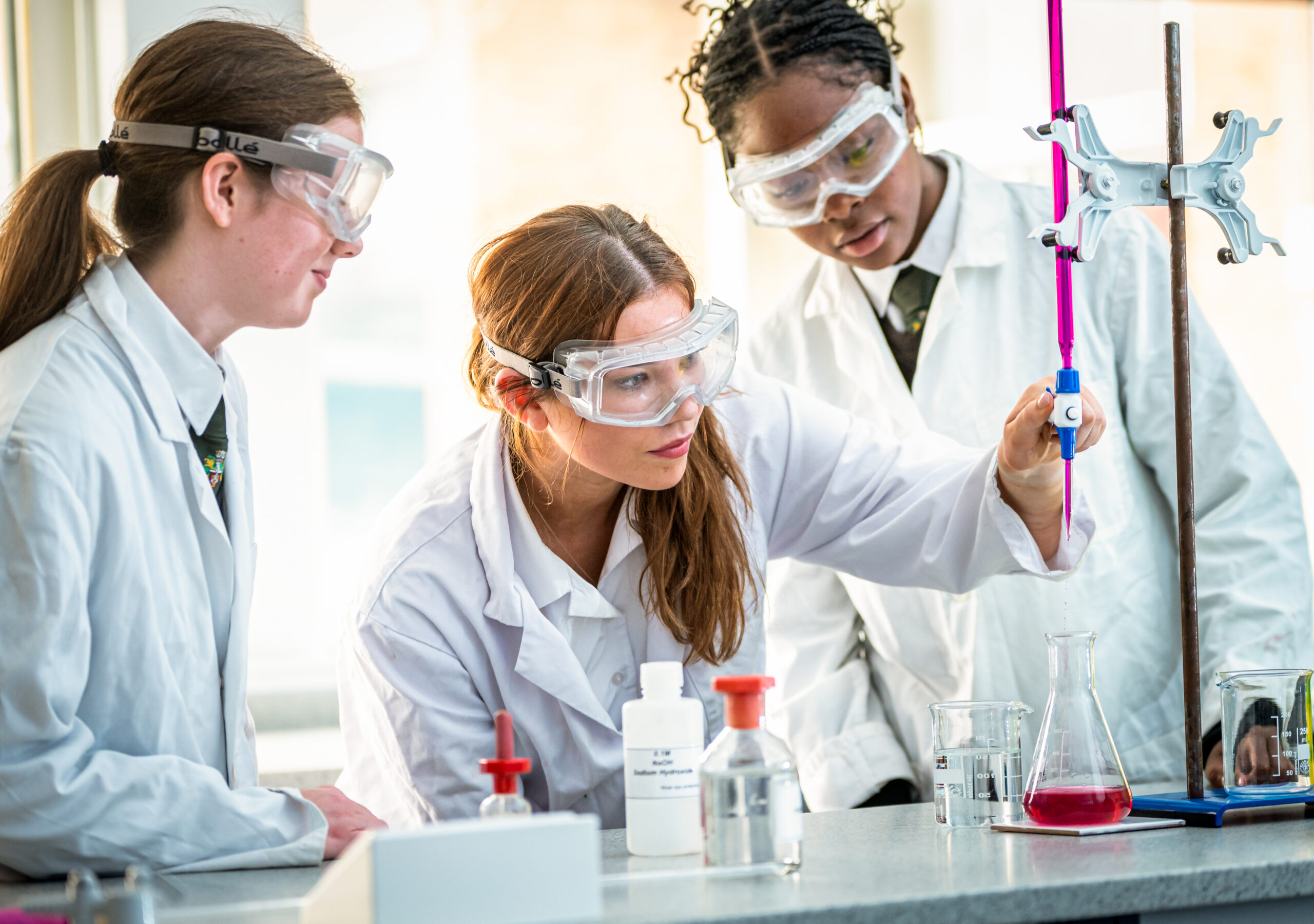Curriculum Intent

The Chemistry department wishes to stimulate and motivate all that study chemistry and to help them develop their sense of curiosity about the chemical world around them. We strive to deliver a challenging and thoughtful curriculum that engages all students and supports them outside of the chemistry classroom. We will help develop our students to become effective learners through challenge and high expectations of what they can achieve. We will support our students on their journey to become global citizens relating what they have studied in chemistry to the dynamic world that they are a member of. We strive to take our students on a journey of discovery from the tiny atom to the enormous atmosphere and in the process develop their practical and mathematical skills in a chemical context. At KS3 students develop their understanding of the material world the reason behind their properties. They look at particles and how they behave and how mixtures can be separated through different practical technique. Students look at chemical reactions and the earth’s climate and are introduced into the Periodic table finding out how the elements are arranged within it. Year 9 is a year that makes the connections between the KS3 and KS4 curriculum where students consolidate their understanding and delve deeper into the big ideas. At KS4 the Periodic table is explored in greater detail and students begin to explain the properties of different materials. At KS5 students explore the physical, inorganic, and organic chemistry in further detail building on the fundamental ideas that they have met during the chemistry studies. Throughout their studies we work with the students to work objectively and methodically looking at how theories have developed through hypothesis, experimentation, observations, and review. As well as succeeding we hope that our students enjoy the sense of awe that we as chemists feel about our subject.
What does it feel like to be a student in the Chemistry Department?

Chemistry explains the observations we make macroscopically on a microscopic level by building on the key idea of particles, how they behave and interact with each other. Throughout a student’s chemistry studies they will be continually challenged building on their understanding of the world around them and how they can apply chemical principals to unfamiliar situations.
Students begin their chemistry journey in year 7 building on the foundations that they have gained from KS2 science to develop a greater depth of understanding. They are challenged to think about what they observe and delve into the microscopic level looking at the properties of matter and begin to appreciate what is taking place during chemical reactions. Throughout their KS3 studies students build up an appreciation of how they have an impact on the environment.
Year 9 is when students begin to explore the chemical world in greater depth extending their KS3 understanding in preparation for KS4 Chemistry. Students make links between the chemical reactions that they have met and how this can bring about energy changes. They look at the structure of the atom and how this relates to the patterns within the periodic table. Students evaluate the evidence for anthropogenic causes of climate change and think about how they and society can reduce their impact.
When they reach the end of year 11 students will have a secure understanding of matter and how it interacts. They will have begun their organic journey looking at how crude oil can be separated and turned into some useful organic molecules that can be made into everyday products such as polymers. They will develop their understanding further looking the bonding and structure of different types of substances and how this gives materials their properties. Industrial processes are introduced, and students gain an appreciation of how much chemistry impacts their life from the production of ammonia to make fertilisers to the analysis of data to produce a life cycle assessment.
During a student’s KS4 studies they will investigate how to make chemical reactions faster, how compounds can be separated physically and chemically, how to find out the composition of different compounds qualitatively and quantitatively as well as many other practical techniques. Students will learn to evaluate data as well as make conclusions based on the information provided as well as their scientific understanding.
KS5 students build on the foundations that they have developed so far. They continue to be challenged in the organic chemistry world being introduced to a variety of different organic molecules and the reaction mechanisms involved in turning them into a different organic molecule. They learn to apply their understanding to unfamiliar contexts that would then support them in further education such as drug design as well as chemical engineering. Students will continue to extend their knowledge of the atom and build on their understanding of structure and bonding finally investigating the different intermolecular forces that give materials their properties
Practical work continues to be carried out and helps develop students understanding of the microscopic world as well as prepare them for further scientific studies beyond school. Students will make a variety of organic molecules including aspirin as well as planning their own investigation, again developing skills that will extend them as well as support them further on.
During their KS5 studies students are encouraged to take part in some challenging competitions to broaden their understanding and think about chemistry in different ways suitable for scientific studies beyond the school environment.
Throughout a student’s chemical studies expectations are high and they will be expected to question and evaluate everything mirroring what it is like to be a scientist. Formulating their ideas based on sound chemical understanding as well as addressing misconceptions. Students will develop the skills to evaluate information as well as the understanding that to make a sound judgement needed to take on board a range of sources of information. Students become equipped for the ever-changing scientific world of which chemistry is a fundamental idea that is needed.
Please click on the button below to download the assessment policy for Chemistry.
